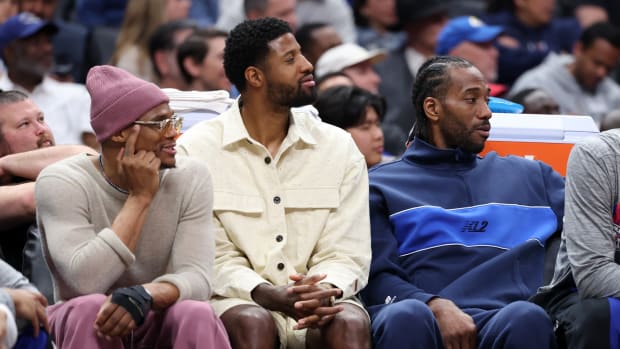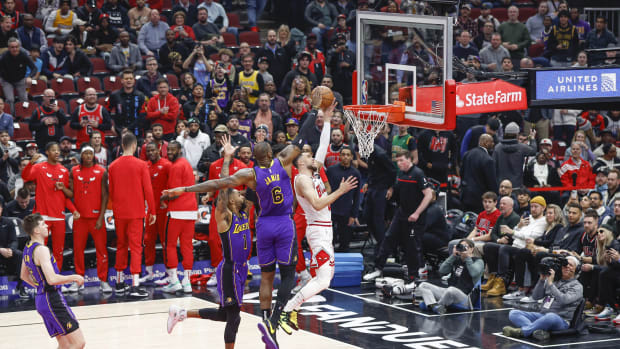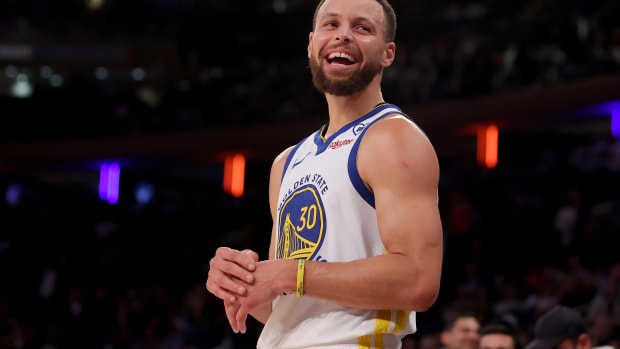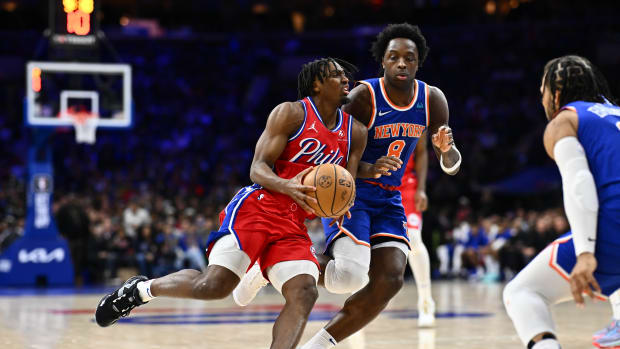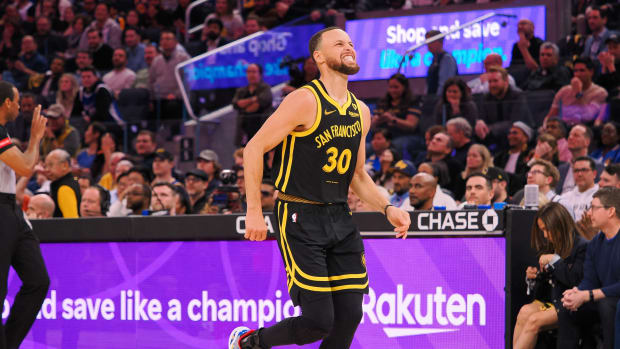Rockets' adjustment on Blake Griffin sparks Game 2 victory over Clippers
HOUSTON—Seventy-two minutes into a series where they were the healthier, higher-seeded, home-standing team, the Rockets finally made their first significant movement toward winning it. Blake Griffin had just steamrolled Terrence Jones and Josh Smith with a choice first half: 26 points on 11-of-14 shooting, each attempt coming with increasing ease. Griffin did as he willed. Houston, for the most part, bore witness.
Allowing Griffin his pick of shot attempts unhurried and unbothered translated to a 41-point second quarter for the Clippers and a 65-56 advantage by halftime. Had that trajectory held, Houston would have given up the first two games of this series from the comforts of the Toyota Center without Chris Paulhaving played a single minute against them.
It was in the second half that the Rockets decided to be more active participants in a 115–109 win that could have effectively decided their season. Among other tweaks, the coverage of Griffin changed completely. Jones saw on-ball duty against Griffin for select possessions only and Smith virtually none. Dwight Howard assumed the first line of defensive responsibility, and in doing so took away the free-throw line post-ups that Griffin had called up regularly in the first half. That space on the floor had allowed Griffin to overpower Jones and Smith quickly; so quickly, in fact, that it interfered with Houston's defensive intentions.
• MORE NBA: Schedule | Grades | Awards | Playoff coverage | Finals picks
"We had to change things up on Blake Griffin," Rockets coach Kevin McHale said. "He was backing us down and making shots. We were, again, too passive, just letting him get away with that. We were trying to trap him, but hell, we couldn’t get there in time. He was spinning, coming from the free-throw line on down."
[daily_cut.NBA]Tasking Howard on Griffin is an adjustment with a cost. It pulls the Rockets' rim protector further from the rim than he'd like, which then leaves little room for error in their other assignments and rotations. That trade-off caught up with them on occasion in the third quarter, though if nothing else Howard helped pry Griffin from a favorite spot and caused the Clippers offense to fizzle. Long stretches of feeding Griffin in the post had left L.A. in a mode of reliance.
"We got out of rhythm offensively," Clippers coach Doc Rivers said. "That’s where the game changed for us. I thought this was the first game we didn’t trust each other with the pass. We did two things: The ball didn’t move and we got stuck trying to get the ball to Blake so much that we forgot that there were other guys on the floor and the ball never changed sides of the floor. That hurt us."
Those problems were even more evident in the Rockets' next adjustment, in which Trevor Ariza played power forward specifically as a measure to counter Griffin. An added complication: Howard never really left. He still hovered behind Griffin, abandoning his man (generally DeAndre Jordan but sometimes others) to shade Griffin specifically. When Griffin was looking for the ball, Ariza denied him by fronting as Howard lurked on the other side.
"When they went front and back, it sort of clogged the lane up," Griffin said. "We didn’t move the ball, we didn’t trust. We got stuck. When teams do that, it has to keep moving, it has to keep flowing because ultimately they should be at a disadvantage with two guys down in the paint."
In theory, that's true. Every instance in which two defenders are brought to the ball should come with a corresponding opening. When that open man is Jordan standing at the three-point line or Austin Rivers (whom the Clippers were reluctant to pass to) sitting in the corner, however, the weight of that disadvantage is null.
Like it or not, Austin Rivers is critical to Clippers' postseason success
This may be where the Clippers miss Paul most. In consecutive halves, to close Game 1 and open Game 2, Los Angeles had proven itself capable of getting into a furious offensive rhythm without its star point guard. Yet when forced to adjust to tactics that might make them uncomfortable, the Clippers only have so much room to wiggle free. What more can Griffin do for this team when he was already doing everything?
On its face, throwing double teams at Griffin, or, alternatively, giving one of the best-passing bigs in the game an open target somewhere on the floor, would seem like the kind of move that might backfire. Here, the value came in trying though. Make the adjustment to see how Griffin deals with the pressure, revise the strategy and go again. NBA players are skilled and heady to the point where the best among them might seem immune to certain tactics. Even if so, it's important that they're made to prove it. On the right night you might slow down Griffin's best scoring game of the playoffs with a small forward and ample support.
Once the Rockets made the process of even getting the ball to Griffin more awkward, the rest of the offense unraveled. J.J. Redick and Matt Barnes, who combined for 37 points in Game 1, went silent. Jamal Crawford was pushed to handle the ball far more often than is healthy for the Clippers offense, yielding 6-of-22 shooting on senseless jumpers of his own making.
• MORE NBA: Series preview | Redick's Game 1 performance | Highlights
"We made a couple adjustments but mostly we just tried to be more physical, getting up on stuff, and trying to force guys different ways and don’t let them settle in," McHale said. "Redick is great at coming off of down screens, we just have to stay attached to him. Jamal’s a tough one-on-one cover on the perimeter but we have a plan on how to play him and when we [executed] it, it was better. I just think it kind of started when our energy level picked up. The guys started catching a rhythm from their energy on the defensive end. That’s what you’ve got to do."
And, really, that's what kept the Rockets alive and in position to earn a 1-1 series split. One could assign meaning to the runaway free-throw attempts (Houston alone took 64, some the product of intentional fouling but most not), Harden's personal resurgence, another outstanding offensive performance from Howard, or any number of factors. It was at halftime, though, that the Rockets found the tactical changes and the defensive zeal to slow Griffin's runaway train—their single most important development in a game they couldn't afford to lose.






























